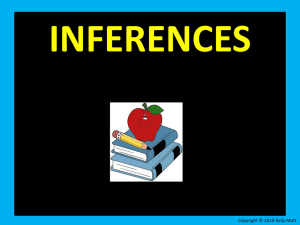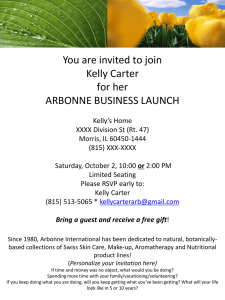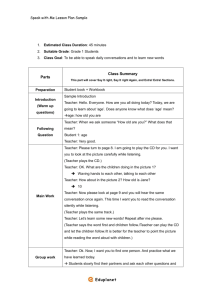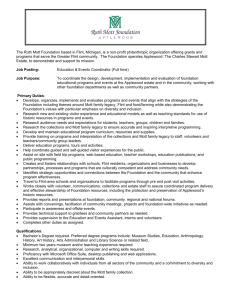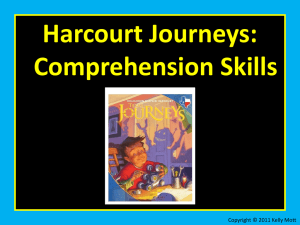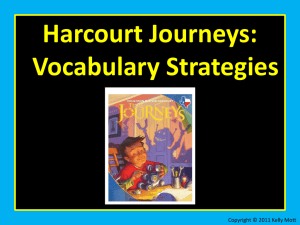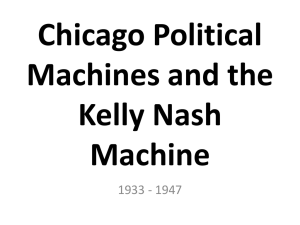Unit 2 Lesson 8 Grammar Skills Coordinating
advertisement
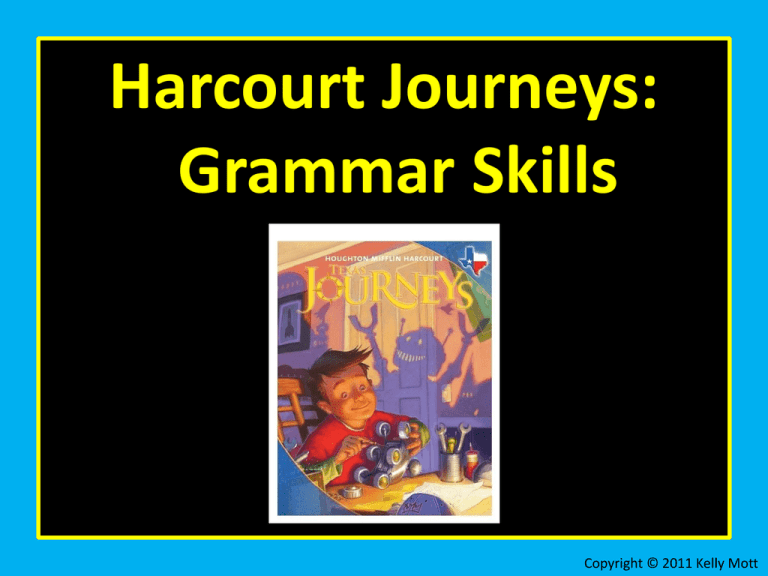
Harcourt Journeys: Grammar Skills Copyright © 2011 Kelly Mott Unit 2: Lesson 8 Copyright © 2011 Kelly Mott This week’s skills: Part 1: Coordinating Conjunctions Part 2: Subordinating Conjunctions Part 3: Correlative Conjunctions Part 4: Sentence Types Review Part 5: Ideas Copyright © 2011 Kelly Mott Coordinating Conjunctions: Part 1: PowerPoint Lesson Part 2: Projectable 8.6 Part 3: Practice Book Page 91 Part 4: Adapted Worksheets Conjunctions And/Or Sheet Conjunctions But/And Sheet Copyright © 2011 Kelly Mott Part 1: Coordinating Conjunctions Copyright © 2011 Kelly Mott Click on the link to watch the Brain Pop Video: http://www.brainpop.com/english/gramm ar/conjunctions/preview.weml Copyright © 2011 Kelly Mott School House Rock Video: http://kmott.wikispaces.com/Conj unction+Junction Copyright © 2011 Kelly Mott SUM IT UP Copyright © 2011 Kelly Mott A conjunction is a joining word used in a sentence. Copyright © 2011 Kelly Mott All of these words are conjunctions: or before if than whether even though while so wherever nor unless since then and until where but because yet although for Copyright © 2011 Kelly Mott There are 3 main types of conjunctions: coordinating conjunctions subordinating conjunctions correlative conjunctions Copyright © 2011 Kelly Mott Today, we are going to study coordinating conjunctions. Copyright © 2011 Kelly Mott A coordinating conjunction is a word that connects other words or groups of words in a sentence. Copyright © 2011 Kelly Mott The most common coordinating conjunctions are the words: and but or Copyright © 2011 Kelly Mott AND Copyright © 2011 Kelly Mott The coordinating conjunction, and, joins things together. Copyright © 2011 Kelly Mott My favorite snacks are crackers and cheese. Lisa and Tom are in the same class. We went to the mall, and we shopped at Macy’s. Copyright © 2011 Kelly Mott BUT Copyright © 2011 Kelly Mott The coordinating conjunction, but, shows contrast. Copyright © 2011 Kelly Mott Dave likes to read, but he doesn’t like math. Copyright © 2011 Kelly Mott The kids were late to school, but they remembered to do their homework. Copyright © 2011 Kelly Mott OR Copyright © 2011 Kelly Mott The coordinating conjunction, or, shows choice. Copyright © 2011 Kelly Mott You can have a packed lunch or a school lunch. Copyright © 2011 Kelly Mott We can go biking, or we can go for a hike. Projectable 8.6 Copyright © 2011 Kelly Mott Turn your Practice Book to page 91. Copyright © 2011 Kelly Mott Adapted Worksheet Conjunctions And/Or Worksheet Copyright © 2011 Kelly Mott Adapted Worksheet Conjunctions But/And Worksheet Copyright © 2011 Kelly Mott Subordinating Conjunctions: Part 1: PowerPoint Lesson Part 2: Projectable 8.7 Part 3: Practice Book Page 92 Part 4: Adapted Worksheet Worksheet If/Unless Worksheet Although/Because Copyright © 2011 Kelly Mott Part 2: Subordinating Conjunctions Copyright © 2011 Kelly Mott A conjunction is a joining word used in a sentence. Copyright © 2011 Kelly Mott All of these words are conjunctions: or before if than whether even though while so wherever nor unless since then and until where but because yet although for Copyright © 2011 Kelly Mott There are 3 main types of conjunctions: coordinating conjunctions subordinating conjunctions correlative conjunctions Copyright © 2011 Kelly Mott Today, we are going to study subordinating conjunctions. Copyright © 2011 Kelly Mott A subordinating conjunction is used to express a relationship. One part of the sentence depends on the other part to make sense. Copyright © 2011 Kelly Mott Common subordinating conjunctions include: if after although when where until because unless Copyright © 2011 Kelly Mott Practice: Find the Subordinate Conjunctions Copyright © 2011 Kelly Mott If I lived in New York City, I would play in the park a lot. Notice one part depends on the other. Copyright © 2011 Kelly Mott I liked New York City because I went to the Statue of Liberty. Notice one part depends on the other. Copyright © 2011 Kelly Mott After I blew out my birthday candles, we ate some cake. Notice one part depends on the other. Copyright © 2011 Kelly Mott Projectable 8.7 Copyright © 2011 Kelly Mott Turn your Practice Book to page 92. Copyright © 2011 Kelly Mott Adapted Practice: If/Then Worksheet Copyright © 2011 Kelly Mott Adapted Practice: Although/Because Worksheet Copyright © 2011 Kelly Mott Correlative Conjunctions: Part 1: PowerPoint Lesson Part 2: Projectable 8.8 Part 3: Practice Book Page 93 Part 4: Adapted Worksheet Correlative Conjunctions Copyright © 2011 Kelly Mott Part 3: Correlative Conjunctions Copyright © 2011 Kelly Mott A conjunction is a joining word used in a sentence. Copyright © 2011 Kelly Mott All of these words are conjunctions: or before if than whether even though while so wherever nor unless since then and until where but because yet although for Copyright © 2011 Kelly Mott There are 3 main types of conjunctions: coordinating conjunctions subordinating conjunctions correlative conjunctions Copyright © 2011 Kelly Mott Today, we are going to study correlative conjunctions. Copyright © 2011 Kelly Mott Correlative conjunctions are used in pairs to join parts of a sentence. Copyright © 2011 Kelly Mott Common correlative conjunctions include: both…and either…or whether…or neither...nor not only…but also Copyright © 2011 Kelly Mott Practice: Find the Correlative Conjunctions Copyright © 2011 Kelly Mott We have seen both the Missouri River and the Big Sioux river. Copyright © 2011 Kelly Mott Either you or I will be the leader on the trail. Copyright © 2011 Kelly Mott The sick rhinoceros would neither eat nor drink. Copyright © 2011 Kelly Mott Not only my father but also my brother played rugby. Copyright © 2011 Kelly Mott I don’t know whether to do the chores now or when I get back from practice. Copyright © 2011 Kelly Mott Projectable 8.8 Copyright © 2011 Kelly Mott Turn your Practice Book to page 93. Copyright © 2011 Kelly Mott Adapted Practice: Correlative Worksheet Copyright © 2011 Kelly Mott Four Kinds of Sentences: Part 1: PowerPoint Lesson Part 2: Practice Part 3: Practice Book Page 94 Part 4: Adapted Worksheets Post Test Worksheet End Marks Worksheet Copyright © 2011 Kelly Mott Part 4: Four Kinds of Sentences Copyright © 2011 Kelly Mott Click on the link to watch the Brain Pop Video: http://www.brainpop.com/english/grammar/pu nctuation/ Copyright © 2011 Kelly Mott Click on the link to watch the Brain Pop Video: http://www.brainpop.com/english/grammar/typ esofsentences/ Copyright © 2011 Kelly Mott Click on the link to watch the Brain Pop Jr. Video: http://www.brainpopjr.com/readingandwriting/ sentence/typesofsentences/ Copyright © 2011 Kelly Mott There are 4 kinds of sentences. Copyright © 2011 Kelly Mott DECLARATIVE Copyright © 2011 Kelly Mott A declarative sentence is a statement. Copyright © 2011 Kelly Mott Statements are sentences that tell something. Copyright © 2011 Kelly Mott Declarative sentences or statements end with a period. Copyright © 2011 Kelly Mott EXAMPLES Copyright © 2011 Kelly Mott DECLARATIVE: I like hamburgers. Copyright © 2011 Kelly Mott DECLARATIVE: We go to East Elementary School. Copyright © 2011 Kelly Mott INTERROGATIVE Copyright © 2011 Kelly Mott An interrogative sentence is a question. Copyright © 2011 Kelly Mott Questions are sentences that ask something. Copyright © 2011 Kelly Mott Interrogative sentences or questions end with a question mark. Copyright © 2011 Kelly Mott EXAMPLES Copyright © 2011 Kelly Mott INTERROGATIVE: Do you like spaghetti? Copyright © 2011 Kelly Mott INTERROGATIVE: Are you going to the movie? Copyright © 2011 Kelly Mott IMPERATIVE Copyright © 2011 Kelly Mott An imperative sentence is a command. Copyright © 2011 Kelly Mott Commands order you to do something. Copyright © 2011 Kelly Mott Imperative sentences or commands end with a period. Copyright © 2011 Kelly Mott EXAMPLES Copyright © 2011 Kelly Mott IMPERATIVE: Please turn in your homework. Copyright © 2011 Kelly Mott IMPERATIVE: Tell me the truth. Copyright © 2011 Kelly Mott EXCLAMATORY Copyright © 2011 Kelly Mott An exclamatory sentence uses an exclamation. Copyright © 2011 Kelly Mott Exclamations show strong feelings. Copyright © 2011 Kelly Mott Exclamatory sentences end with an exclamation point. Copyright © 2011 Kelly Mott EXAMPLES Copyright © 2011 Kelly Mott EXCLAMATORY: Wow, that was so cool! Copyright © 2011 Kelly Mott EXCLAMATORY: This is the best birthday party ever! Copyright © 2011 Kelly Mott Let’s Practice! Copyright © 2011 Kelly Mott Punctuation Practice – Click on the object to open presentation: Let’s Put an end to sentences! Language Arts Copyright © 2011 Kelly Mott Directions: Read the sentence and choose the sentence type. Copyright © 2011 Kelly Mott This chocolate cake tastes wonderful! a. Declarative b. Interrogative c. Imperative d. Exclamatory Copyright © 2011 Kelly Mott You’re Right! Copyright © 2011 Kelly Mott Incorrect, Try Again. Copyright © 2011 Kelly Mott Do you think my hair looks good? a. b. c. d. Declarative Interrogative Imperative Exclamatory Copyright © 2011 Kelly Mott You’re Right! Copyright © 2011 Kelly Mott Incorrect, Try Again. Copyright © 2011 Kelly Mott Take out the trash, please. a. b. c. d. Declarative Interrogative Imperative Exclamatory Copyright © 2011 Kelly Mott You’re Right! Copyright © 2011 Kelly Mott Incorrect, Try Again. Copyright © 2011 Kelly Mott My favorite vegetable is spinach. a. b. c. d. Declarative Interrogative Imperative Exclamatory Copyright © 2011 Kelly Mott You’re Right! Copyright © 2011 Kelly Mott Incorrect, Try Again. Copyright © 2011 Kelly Mott Copyright © 2011 Kelly Mott Turn your Practice Book to page 94. Copyright © 2011 Kelly Mott Adapted Practice: Post Test Copyright © 2011 Kelly Mott Adapted Practice: End Marks Copyright © 2011 Kelly Mott Ideas: Part 1: Practice Book Page 95 Copyright © 2011 Kelly Mott Part 5: Ideas Copyright © 2011 Kelly Mott Turn your Practice Book to page 95. Copyright © 2011 Kelly Mott How did you do? Copyright © 2011 Kelly Mott Copyright © 2011 Kelly Mott

